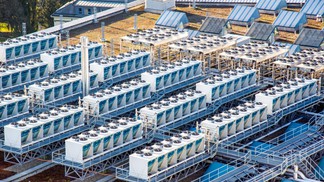Climate change changes Swiss lakes

A new study shows that climate change could significantly alter water temperature, ice cover and brewing of many Swiss lakes. Medium-altitude lakes are particularly exposed. They may lose their entire ice cover and no longer be fully brewed twice a year. Such a change would have dramatic consequences on the functioning of lake ecosystems.
Lakes are subject to strong seasonal cycles. In many high- and medium- and high-altitude Swiss lakes, water is brewed from the surface to the bottom in the spring and autumn. This vertical mixing influences many chemical and ecological processes. Oxygen-rich, nutrient-poor surface water mixes with low-oxygen, nutrient-rich water from the bottom of the lake. This phenomenon balances the temperature of the lake even in the deep layers. In winter and summer, however, water from the depths is separated from the surface by a stable stratification of temperature. Lake ecosystems and the entire food chain, from plankton to fish, are accustomed to these seasonal variations.
Climate change changes seasonal cycles
As a new study by the Eawag Water Research Institute shows, climate change has a profound impact on these cycles in Swiss lakes. “The intensity of the movement of lakes to climate change depends in particular on their altitude and size. Medium-altitude lakes are particularly sensitive,” says Love Raman Vinn, from the Surface Water Research Department.
For this study, a team of researchers assembled by R-man Vinn, studied 29 Swiss lakes located on altitude gradients of 193 m to 1797 m. They simulated the dynamic processes of the lakes using the simstrat single-dimensional physical lake model. For the first time, Vinn and his team were also able to use the new Swiss climate scenarios (CH2018), which take into account the complex topography of the Alps to represent the local climate in detail. The simulation of the effects of climate change on lake dynamics is thus much more accurate than in previous studies. Three future scenarios have been used: the worst-case scenario implies a steady increase in greenhouse gases, while in the intermediate scenario, emissions peak around 2050 and in the strictest scenario, global warming does not exceed 2oC.
Major change in brewing of medium-altitude lakes
The result of the simulations is unequivocal: if the climate warms by more than 2oC, many medium-altitude lakes are at risk of losing their ice cover during the 21st century, such as Lake Joux or Lake Klintal. Less ice results in a more intense vertical exchange between surface water and deep layers, preventing the formation of stable stratification and therefore shortening its duration. In summer, on the other hand, the duration of stable stratification increases, increasing the risk of a lack of oxygen in deep water. In addition, prolonged stratification in summer may promote the growth of toxic algae cyanobacteria.
As a result, many medium-altitude lakes could move from an dicictic mixing regime with two deep water brews per year to a monomictic diet with a single annual brew. Changes in the diet of this type have serious consequences for the accumulation of heat in lakes and the distribution of oxygen and nutrients. The habitats of many aquatic animals could be profoundly altered as the water warms through the surface and oxygen remains low in depth. “But if we can limit global warming, we can preserve the ice cover and prevent the change in the mixing regime of most lakes,” says Vinn.
The mountain lakes and large lakes of the Plateau maintain their mixing regime
According to all the climatic scenarios of the typical study, high-altitude lakes, such as Lake St. Moritz at 1768 meters, remain dictic, at least for the 21st century. Surprisingly, the water in these lakes is warming more and the duration of ice cover and stable stratification is shortening faster in winter than at lower altitudes. However, the dynamics of the lakes are unlikely to change in the current century. A layer of ice will continue to form on high-altitude lakes, allowing for a semi-annual vertical mixing. According to the study, the great lakes of the Swiss Plateau, such as zurich or Lake Geneva, which already have a monomictic diet, will probably retain an irreguised brewing cycle.
“During the 21st century, Swiss lakes will change as a result of climate change. But our study shows that taking substantial measures for climate protection will nevertheless limit most of the effects. Few lakes would reach the tipping point and undergo major changes to their operating systems, says Vinn.
Admin.ch – Switzerland Government Portal – Source and details release









